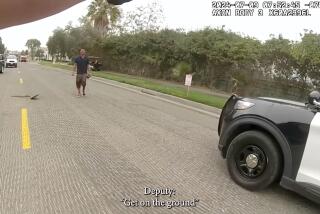From the archives:: J. Paul Getty III dies at 54; scion of oil dynasty
J. Paul Getty III, a scion of the Getty oil dynasty whose tragedies — mutilation by kidnappers in the early 1970s and an incapacitating, drug-induced stroke in the 1980s — brought into high relief the dysfunctional relations that beset his famously wealthy family, has died in Buckinghamshire, England. He was 54.
Getty, who had homes in the Los Angeles area for some years after his ordeals, died Saturday after a long illness, according to a statement from his actor-son, Balthazar.
Left nearly blind and a quadriplegic after the stroke, Getty was known to the public largely for his misfortunes. A father of two and grandfather of six, he “taught us how to live our lives and overcome obstacles and extreme adversity and we shall miss him dearly,” his son said.
Getty was the grandson of American oil magnate J. Paul Getty, whose fortune built the J. Paul Getty Museum. A notorious miser who installed a pay phone in his mansion, the elder Getty headed a family that seemed plagued by illnesses, addictions and other disasters.
The most sensational event in the family’s history was the young Getty’s 1973 kidnapping from a Rome piazza when he was 16. Several days after his disappearance, his kidnappers notified a local newspaper that he was being held by the Mafia. His grandfather and father at first believed the kidnapping to be a hoax and refused to pay any ransom until incontrovertible evidence was provided: young Getty’s severed right ear and photos showing him shorn of the body part.
The crime occurred in an era of high-profile kidnappings: The following year American heiress Patty Hearst was abducted by members of the radical Symbionese Liberation Army; she later joined her kidnappers’ cause. Getty, on the other hand, seemed to have no agenda other than to stay out of school (he reportedly was expelled by several), become an artist and lead an extravagantly bohemian lifestyle.
Born Nov. 5, 1956, he grew up in Rome, the oldest of four children of John Paul Getty II, who ran the family’s oil concerns in Italy. As a red-haired toddler, he was said to be one of his grandfather’s favorites. After his parents divorced in 1964, he saw little of his father and remained in Italy with his mother, former actress Gail Harris.
On July 10, 1973, after a night of carousing with hippie friends, he was abducted by several men and driven 200 miles to a hiding place in the mountains of Calabria. A ransom demand was delivered a week later. Harris sought help from her son’s father and grandfather, but they viewed his disappearance as a money-making scheme by an unruly teenager.
As time dragged on, the Getty patriarch’s stony rejections of her pleas continued. “I have 14 grandchildren,” he told reporters, “and if I pay one penny ransom, I’ll have 14 kidnapped grandchildren.” According to biographer Robert Lenzner, the eldest Getty refused to talk to Harris or his son and communicated through intermediaries.
Four months into the kidnapping, a package arrived at the offices of a Rome newspaper. It contained a lock of red hair and a moldy human ear. An accompanying letter demanded more than $3 million in ransom. Soon after, the kidnappers provided photographs of Getty minus the ear and wrote that if their demands were ignored they would return the boy “piece by piece.”
His billionaire grandfather yielded to the demands a short time later. According to Lenzner and other reports, he contributed $2.2 million toward the ransom and charged his son interest on the rest.
Getty was freed in a small town south of Naples on Dec. 15, 1973, which happened to be his grandfather’s 81st birthday. According to some reports, he tried to call his grandfather to thank him for obtaining his release, but the elder Getty refused to come to the phone. The young man cut off relations with both his grandfather and father.
Several of the kidnappers were apprehended. They were a motley group who included a carpenter, a hospital orderly, an ex-con and an olive-oil dealer from Calabria. Most of the ransom money was never recovered.
A year after his release, at age 18, Getty married Martine Zacher, who was six years his senior. His grandfather disapproved of his marrying so young and disinherited him. When the senior Getty died in 1976, he left $500 to his son and nothing to his grandson.
Over the next several years, Getty tried to put his life back together. He moved to Los Angeles and studied for one semester at Pepperdine University in Malibu. He underwent a series of operations to reconstruct his ear. However, he was also addicted to drugs and alcohol, which led to a near-fatal stroke in 1981. He and his mother later sued his father to force him to pay for his medical treatment, which was reported at the time to have cost $25,000 a month. His father died in 2003.
After Getty’s marriage collapsed in the 1990s, he lived with his mother in Brentwood. In recent years he spent most of his time in Ireland and Italy.
Among his survivors are his siblings, including AIDS activist Aileen Getty.
More to Read
Start your day right
Sign up for Essential California for the L.A. Times biggest news, features and recommendations in your inbox six days a week.
You may occasionally receive promotional content from the Los Angeles Times.







